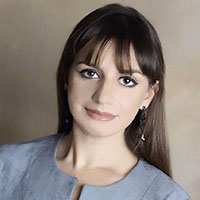

Email: nil@gatech.edu
Position: PhD Candidate and Research Assistant
Current Institution: Georgia Institute of Technology
Abstract: Toward Wearable Sensing Enabled Closed-Loop Non-invasive Vagus Nerve Stimulation
Autonomic nervous system imbalance with elevated sympathetic activity is the hallmark of many mental disorders, and vagus nerve stimulation (VNS) using an implantable device is a proven treatment method to address such imbalance. Non-invasive cervical VNS (n-VNS) offers an inexpensive and low-risk alternative to implantable VNS devices, but may require auxiliary real-time physiological sensing to ensure efficacy and potentially close the loop for stimulation parameter tuning. In this work, in collaboration with Emory University School of Medicine Departments of Cardiology, Radiology, Psychiatry, and Rollins School of Public Health, I investigate the real-time, non-invasively-measured, cardiovascular and peripheral biomarkers of n-VNS that could quantify the stimulation efficacy based on the changes in sympathetic activity. I also evaluate the effects of n-VNS applied after mental stressors on stress-related physiological changes detected through wearable sensing. Healthy subjects and patients with post-traumatic stress disorder (PTSD) are enrolled in a three-day protocol that includes active or sham n-VNS application, bio-signal, blood biomarker, and high-resolution positron emission tomography (HR-PET) collection. Various mental stressors are applied throughout the protocol. Near-term research questions include: 1) understanding the kinetics of n-VNS from bio-signals, and the relevance of wearable sensor data to the gold standard serum biomarkers and imaging, and 2) real-time optimization of n-VNS treatment efficacy through wearable sensing.
Bio:
Nil Gurel is a PhD candidate in the School of Electrical and Computer Engineering (ECE) at Georgia Tech. Her research focuses on physiological modulation, monitoring, and active sensing. She works on biomedical instrumentation, signal processing, and machine learning to understand real-time non-invasive biomarkers to close the loop for treatment optimization. Nil received a BS in Electrical and Electronics Engineering from Boğaziçi University, Istanbul, Turkey, and M.S. in ECE from University of Maryland, College Park, MD. Her MS work focused on bio-inspired sensing for micro-aerial vehicles. She is the recipient of numerous awards and fellowships including Clark School of Engineering Graduate Fellowship (2014-2015), NextFlex Flexible Hybrid Electronics Best Poster Award (2017), IEEE Body Sensor Networks Conference Runner-up Best Paper Award (2018), IEEE Engineering in Medicine and Biology Conference Open Finalist (2018). Besides her research, she has been awarded Teaching and Development Fellowship (UMD, 2015), and iREDEFINE Professional Development Award (NSF, 2018).

